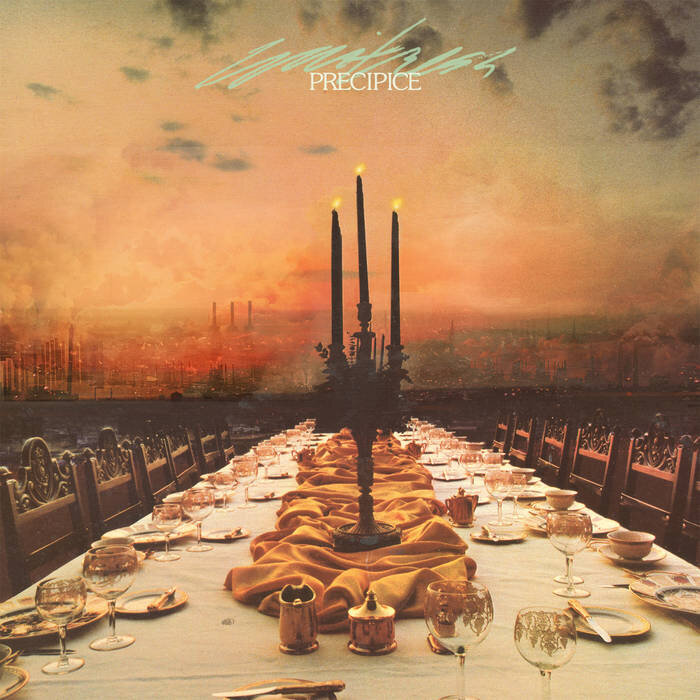Snake River, Waitress, and June Thrasher
Snake River
Lost Album // Self-Released
On Lost Album prairie psych-rockers Snake River take the listener on a pleasure cruise through the vast galaxy of psychedelic music. Like other neo-psych exemplars such as The Olivia Tremor Control or Spiritualized, Snake River pay their respects to the fab four, before veering off course and charting their own magical mystery tour packed with tasteful reverb, phantasmagoric harmonies, waves of noise, and tantalizing grooves. Whether cruising steadily, or drifting along in the tranquil vacuum of space, Snake River remain in control as they visit the outer reaches of psychedelia.
This review’s interstellar space tour motif is getting tired by this point, but Lost Album never falls into such a rut. Even though a couple of the songs breach the seven minute mark, the longer, floatier songs like “(You’re A) Zenith in This Tiny Work” are followed by zippy psych-rock bursts. Refraining from doing the same thing for too long keeps Lost Album fresh and interesting. Following the upbeat sun-blessed groove of “Afraid of Love” with the haunted desert psych of “Let the Night Fall” puts Snake River’s range on display. Having the ability to write satisfying songs in different modes is one thing, but organizing them in a way that showcases the band’s versatility without letting the record become disjointed is something to be celebrated in its own right.
Snake River take some risks on Lost Album, which covers more ground that its predecessor Tread on to the Unknown You, but they succeed at every turn. Seven minute album opener “Bloody Hell” is a masterclass in the slow-burn as new instruments are continuously brought into the fold. It begins with guitar, and vocals, and somehow the addition of synth and violin don’t feel contrived, but rather fitting. By the time the Black Angels-esque groove marches in, the listener is entranced. Starting off the album with such a late bloomer exhibits the band’s commitment to creating a well-balanced album from start to finish. It’s a risk in the days of streaming services when artists can’t count on the listener sticking around until the end of Side A at the very least, but it pays off. The band reels it in for the mid-tempo follow-up “Jeanie, I’ve Waited A Long Time,” which feels like Snake River’s version of Revolver tracks such as “And Your Bird Can Sing.” These two opening tracks are proof that the band is dedicated to making a dynamic record with a deliberate flow, and the rest of the album continues the cascade.
The title Lost Album may make the album sound like a discarded collection of forgotten songs, but every element of the record is thoughtful. From the charming lick-after-lick guitarwork that never feels indulgent, to the textural synths and the rich harmonies, everything fits, and nothing is missing or overdone. The songs go from somber to ebullient, minimal to lush, and from reserved to unhinged. On Lost Album Snake River embody the old hippie mantra: Not all those who wander are lost.
- Devon Dozlaw
Waitress
Precipice // Self-released
Saskatoon synthpop duo Waitress have emerged with a spectacular new album after last releasing a full-length nearly five years ago. Their 2016 debut album Delay our Time created a lot of buzz and led to a performance at notable Calgary festival Sled Island. They later released a split EP with Saskatoon band Ancient Pigs in 2017 but then the output of new music stopped. The band became relatively quiet between 2017 to 2020 besides occasional live performances. The new album Precipice arrives at the perfect moment. The music matches the heavy undertones of our current climate but brings lift and positivity to these times with infectious melodies and poetic lyrics that are delivered with ease. The striking cover art features a long, elegantly decorated dinner table placed in front of a smoky industrial city… interpret that how you may.
The pulsating songs on Precipice have a momentum that carries the listener on a sonic journey and encourages steps into the unknown. Arpeggiated synthesizer weaves with guitar and electro drum beats move in and out of the mix. The well-thought-out production allows for one to get lost in the dreamy soundscapes. It’s the type of album that delivers the goods as a close listening experience, but also holds its own when you press play with the intention to simply dance away anything that is holding you down.
Precipice opens with a six and a half minute long track titled “Clandestine (Parts 1 & 2)”. The assumed Part 1 is a three minute instrumental piece - a bold way to open an album that otherwise features vocals throughout the majority of the songs. In Part 2 of the opening track, the lyric “How far would you go without turning around?” is stated multiple times and beautifully captures the focus of the album. This question - together with the extended instrumental section - invites the listener into a state of inner reflection. The album closes with another moving instrumental piece titled “Terraform”. These instrumental bookends demonstrate that Waitress recognizes there is just as much power and purpose in their instruments as there is in their lyrics.
Precipice came together over many stops and starts, building songs from ideas that were left in limbo since their last album. Waitress (Janice Weber and Kalon Beaudry) produced, recorded and wrote the album themselves besides track 2: an impressive cover of dream-pop band Luna’s “Gin”. The cohesive album does not sound like it was pulled together from odds and ends which is a testament to the duo’s ability to stay true to their sound and harness their strengths on a recording.
If you grew up with Canadian synthpop bands like Stars, the dual vocals and electronic sounds will take you back to the mid-2000’s where we danced in bedrooms to songs like “The Night Starts Here” and “Take Me to the Riot”. Waitress is honouring their influences while pushing themselves into a new territory… moving into a dreamier and more present world than what we previously knew, as referenced on “Lullaby”: “I’ll sing you a new song, a lullaby to sing you awake”. While it may seem like we’re on a dangerous precipice and doomed to drop off into the frightening unknown, Waitress have produced an album that is a soothing soundtrack for these days full of uncertainty.
- Greg Torwalt
June Thrasher
Viper Creek // Self-Released
June Thrasher is the new instrumental ambient synthwave project from multi-instrumentalist and producer Kaelen Klypak, and debut album Viper Creek represents a dynamic offering that uses cinematic mood and driving rhythm to brilliant effect. June Thrasher moves with ease on a continuum between energetic lazer-show bangers worthy of the grittiest dystopian sci-fi, and sprawling, meditative soundscapes that just might be the balm to soothe your next bout of anxiety-ridden insomnia.
On opener “Berlin”, the album begins with something further towards the ambient side of that spectrum. While its cascading melody slowly washes over and envelopes the listener like a warm bath, the subtle bass pads hint at something heavier looming on the horizon. When the beat kicks in and the tempo and melody shifts into a high-throttle synthwave gear in follow-up track “Windmill City”, it’s easy to imagine June Thrasher as an alternative retro-futurist soundtrack for your favourite 80’s (or 80’s-influenced) pop culture reference point — be it Blade Runner or Knight Rider or Drive or Hotline Miami or Stranger Things. The cinematic quality of this album that conjures up those familiar neon-splashed visuals is ever-present, and is a testament to how adeptly Klypak has approached the synthwave genre. And throughout Viper Creek, the wax and wane of ambient and synthwave is a balancing act that is executed on both sides with care and skill.
Klypak has stated that much of the creative inspiration behind the songs on Viper Creek comes from the expansive prairie landscapes that surround him in his Saskatoon home (he actually released the album with an accompanying book of photography). While synthwave music might typically be associated with more futuristic or urban imagery, anybody who has been fortunate enough to catch a prairie sky at the right moment knows that its vibrant and mercurial palette of colours can rival any neon-lit cityscape, and June Thrasher makes this visual connection easy to appreciate. But I think there is more to consider in the parallels of environment and sound on Viper Creek — yes, there are wide-open spaces and vivid cotton-candy sunsets, but there’s also the tempestuousness of a vast living sky that can go from calm blue to swirling black in a moment; the crystalline subzero air and biotic slumber of another endless frozen January; industrial ribbons of asphalt and wire and steel that cut artificial, unbroken lines across the land; the ebb and flow of wind through grasses and hopeful wildflowers; abandoned homesteads and towns of splinter and dust, simultaneously decaying and being reclaimed by nature; and all the gradually-unfolding beauty and life clinging to this very fractured landscape that is easy to miss when you speed past at 120 km/hr in hermetic comfort. These scenes have their own kind of splendor and dystopian grime, their own energy, rhythms, and emotions, and June Thrasher succeeds in evoking them all at times. (If it seems like I might be reaching with these visuals at all, check out this music video that June Thrasher filmed in a decommissioned grain elevator.)
Written and performed using only hardware gear — so without the aid of computers, DAWs, or software synth emulators — this album, and by extension June Thrasher, are projects made with live performance and intimate connection in mind. Whilst COVID-19 has obviously put the brakes on that, Klypak has hinted at some big ideas to come for a live show to accompany these songs. Until then, and whether your mood is one of chill introspection, future-looking optimism, or dark neo-noir romance, Viper Creek offers plenty of atmosphere to fit the occasion.
- Julie Maier



